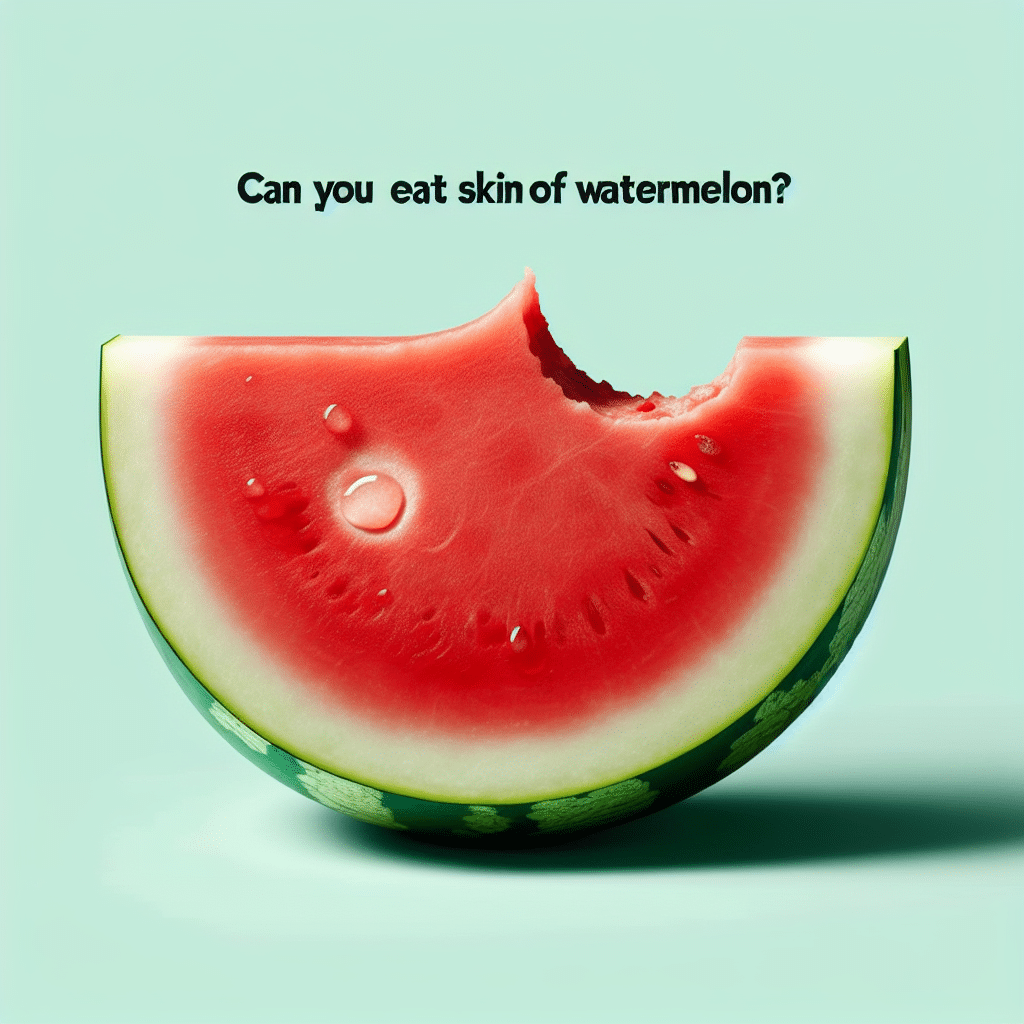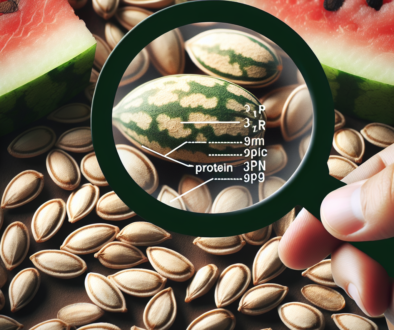Can You Eat Skin Of Watermelon?
-
Table of Contents
- Eating Watermelon Skin: Is It Safe and Beneficial?
- Understanding Watermelon Skin
- Is Watermelon Skin Edible?
- Nutritional Benefits of Watermelon Skin
- Culinary Uses of Watermelon Skin
- Potential Health Concerns
- Case Studies and Research
- Conclusion: Embracing the Whole Watermelon
- Discover ETprotein’s Watermelon Seed Protein
Eating Watermelon Skin: Is It Safe and Beneficial?

Watermelon is a refreshing and popular fruit, especially during the hot summer months. While most people are accustomed to consuming the juicy red flesh, the green rind or skin is often discarded without a second thought. However, recent discussions and studies have brought attention to the potential benefits of eating watermelon skin. This article delves into the safety, nutritional benefits, and culinary uses of watermelon skin, providing a comprehensive look at this often-overlooked part of the fruit.
Understanding Watermelon Skin
Watermelon skin consists of two parts: the outer green rind and the inner white rind. The green rind is the tougher, outermost layer that protects the fruit, while the white rind is the part that lies between the green rind and the red flesh. Both layers are typically considered inedible due to their texture and taste, but they are actually safe to consume and can offer a range of health benefits.
Is Watermelon Skin Edible?
Yes, watermelon skin is edible. While it’s not as sweet or soft as the flesh, it is perfectly safe to eat. In fact, in many cultures, watermelon rind is used in cooking and preserving. However, it’s important to wash the skin thoroughly to remove any pesticides or dirt before consumption.
Nutritional Benefits of Watermelon Skin
Watermelon skin is rich in nutrients that can contribute to a healthy diet. Here are some of the key nutritional components:
- Vitamins: Watermelon skin contains vitamins C and B6, which are important for immune function and energy metabolism, respectively.
- Minerals: It is a good source of potassium and magnesium, which are essential for heart health, muscle function, and maintaining a healthy blood pressure.
- Dietary Fiber: The rind is high in dietary fiber, which aids in digestion and can help prevent constipation.
- Citrulline: An amino acid that can improve blood flow and may have potential benefits for cardiovascular health.
These nutrients make watermelon skin a healthy addition to your diet, particularly if you’re looking to increase your intake of vitamins, minerals, and fiber.
Culinary Uses of Watermelon Skin
Watermelon skin can be used in a variety of dishes. Here are some creative ways to incorporate it into your meals:
- Pickled Watermelon Rind: A traditional Southern United States delicacy, pickled watermelon rind is a sweet and tangy treat.
- Watermelon Rind Stir-Fry: In some Asian cuisines, the rind is stir-fried with vegetables and protein for a crunchy addition to meals.
- Watermelon Rind Curry: The rind can be used as a vegetable in curries, absorbing the flavors of the spices and sauce.
- Watermelon Rind Preserves: Similar to jams, watermelon rind can be cooked down with sugar to make a sweet preserve.
These uses not only add a unique flavor and texture to dishes but also help in reducing food waste by utilizing the entire fruit.
Potential Health Concerns
While watermelon skin is safe for most people to eat, there are a few potential health concerns to consider:
- Pesticides: Watermelons may be treated with pesticides, which can linger on the skin. Always wash the rind thoroughly or choose organic watermelons to minimize exposure.
- Digestive Issues: Due to its high fiber content, eating large amounts of watermelon skin may lead to digestive discomfort for some individuals.
It’s also worth noting that individuals with allergies or sensitivities to watermelon should avoid the skin as well.
Case Studies and Research
Research on watermelon skin is limited, but studies on citrulline, one of the key nutrients found in the rind, suggest that it may have various health benefits. For example, a study published in the “Journal of Agriculture and Food Chemistry” found that citrulline might help improve blood flow and reduce blood pressure.
Moreover, the dietary fiber in watermelon skin has been consistently linked to improved digestive health in numerous studies, highlighting the potential benefits of including more fibrous foods in one’s diet.
Conclusion: Embracing the Whole Watermelon
In conclusion, watermelon skin is not only safe to eat but also offers a variety of nutritional benefits. From vitamins and minerals to dietary fiber and amino acids, the rind of this popular fruit can be a healthy addition to your diet. By incorporating watermelon skin into your culinary repertoire, you can enjoy new flavors, reduce food waste, and take advantage of the full range of nutrients the fruit has to offer.
Discover ETprotein’s Watermelon Seed Protein
If you’re interested in the benefits of watermelon and are looking for a plant-based protein source, ETprotein offers a high-quality watermelon seed protein. This product is an excellent way to incorporate the nutritional benefits of watermelon into your diet in a convenient and versatile form. Whether you’re formulating new health products or seeking to enhance your personal nutrition, ETprotein’s watermelon seed protein is an ideal choice.
About ETprotein:
ETprotein, a reputable protein and L-(+)-Ergothioneine (EGT) Chinese factory manufacturer and supplier, is renowned for producing, stocking, exporting, and delivering the highest quality organic bulk vegan proteins and L-(+)-Ergothioneine. They include Organic rice protein, clear rice protein, pea protein, clear pea protein, watermelon seed protein, pumpkin seed protein, sunflower seed protein, mung bean protein, peanut protein, and L-(+)-Ergothioneine EGT Pharmaceutical grade, L-(+)-Ergothioneine EGT food grade, L-(+)-Ergothioneine EGT cosmetic grade, L-(+)-Ergothioneine EGT reference grade and L-(+)-Ergothioneine EGT standard. Their offerings, characterized by a neutral taste, non-GMO, allergen-free attributes, with L-(+)-Ergothioneine purity over 98%, 99%, cater to a diverse range of industries. They serve nutraceutical, pharmaceutical, cosmeceutical, veterinary, as well as food and beverage finished product distributors, traders, and manufacturers across Europe, USA, Canada, Australia, Thailand, Japan, Korea, Brazil, and Chile, among others.
ETprotein specialization includes exporting and delivering tailor-made protein powder and finished nutritional supplements. Their extensive product range covers sectors like Food and Beverage, Sports Nutrition, Weight Management, Dietary Supplements, Health and Wellness Products, and Infant Formula, ensuring comprehensive solutions to meet all your protein needs.
As a trusted company by leading global food and beverage brands and Fortune 500 companies, ETprotein reinforces China’s reputation in the global arena. For more information or to sample their products, please contact them and email sales(at)ETprotein.com today.














